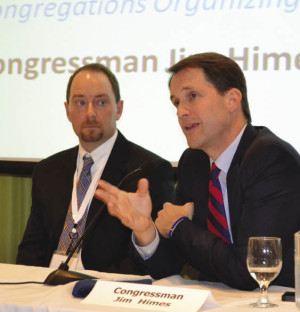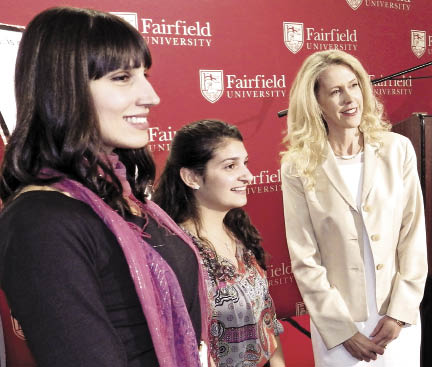For many in the developing world, America is still the land of opportunity.
That abstract opportunity ”” “yearning to breathe free” ”” in turn presents America with the opportunity to capitalize on its status as the world”™s immigrant destination of choice, activists say.
At an immigration forum in Bridgeport Nov. 1, hosted by the Fairfield County Community Foundation, more than 30 speakers and panelists expressed the importance of immigration, immigrants”™ contributions to society and the need for comprehensive reform at the national level.
Nearly 200 participants attended the conference.

“Our streets are paved with gold and no amount of barriers will stop those trying to get in,” said panelist Chris Bruhl, president of the Business Council of Fairfield County.
In the last 20 years, immigrants helped start 25 percent of all public companies in the U.S., worth $500 billion to the national economy, according to the National Venture Capital Association. Yet, many immigrants face uncertain futures, whether they are documented or undocumented. Some question whether the headache of a long path to citizenship is worth it, while others will forgo critical medical treatment for fear of deportation, speakers said.
This summer the U.S. Senate passed the most ambitious immigration reform bill to date, however the issue has yet to be voted on in the House. The bill included a pathway to citizenship for the undocumented, an accelerated path for children, increased boarder security and a heightened employment verification system.
Rep. Jim Himes, a Greenwich Democrat and speaker at the event, said he believed the House has enough votes to pass the bill into law, but said the issue hasn”™t come to a vote because of “an intensely negative cohort” of Republicans “hell-bent” on preventing reform.
“The opposition here is based on a core fear of change in this country and this country is changing pretty dramatically,” Himes said, citing figures predicting a minority majority in 20 years. “That fear gets turbocharged at times of economic uncertainty ”¦ But when the economy improves the temperature will come down.”
“We will pass immigration reform,” he added. “It”™s a question of when.”
Touting the economic contributions of immigrants, Bruhl of the business council said retailers have seen the buying power of immigrants, however there is also a need to tap into the economic advantages of having immigrants contribute to a highly skilled workforce.
If you live in Connecticut and have a college degree, you”™re more likely to be foreign-born than born in Connecticut, Bruhl said. Still, there is a large portion of the immigrant population that is “substituting grit for skills,” working multiple low-wage jobs because of a language barrier even if they are highly skilled.
In response, Bruhl called for more businesses to offer language training to help immigrants both advance into management positions and be hired elsewhere, opening up a new pool of talent for the business community as a whole.
Historically during large waves of immigration there is a “blowback” period of violence and racism, said panelist Rev. Richard Ryscavage, a Fairfield University director for the school”™s faith center. But as the demographics of the country change, Ryscavage said it will be the immigrants taking care of the baby boomers in their old age, paying taxes toward their Medicare and Social Security costs.
“To be shortsighted about immigration isn”™t looking to take care of the future of the United States,” Ryscavage said. There are pressures in overloaded hospitals and failing schools to deal with the issues of immigration, but Ryscavage said he believes deportation is not the answer.
“The largest number of deportations is going on now under Obama and that means breaking up families,” Ryscavage said. “Broken and separated families are a recipe for social disaster, especially among young people.”
On the other side of the coin, Ryscavage also mentioned the responsibility immigrants have to reach out to their neighborhoods, who might otherwise be scared of them.
“Look at it through the eyes of the old lady in Long Island who”™s lived in the same neighborhood all her life and now the corner store only speaks Spanish,” he said. “The need for the immigrants to reach out to the community is extremely important. If you”™re going to live in a mixed neighborhood, you have to mix it up.”
“You have to build social conditions that allow everyone in the community to reach their full human potential,” he said.





















